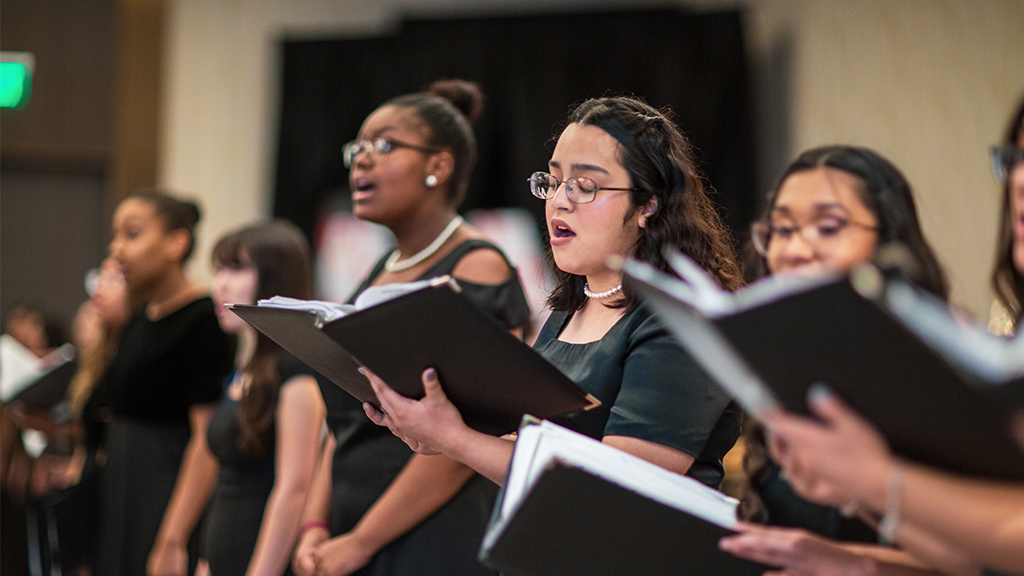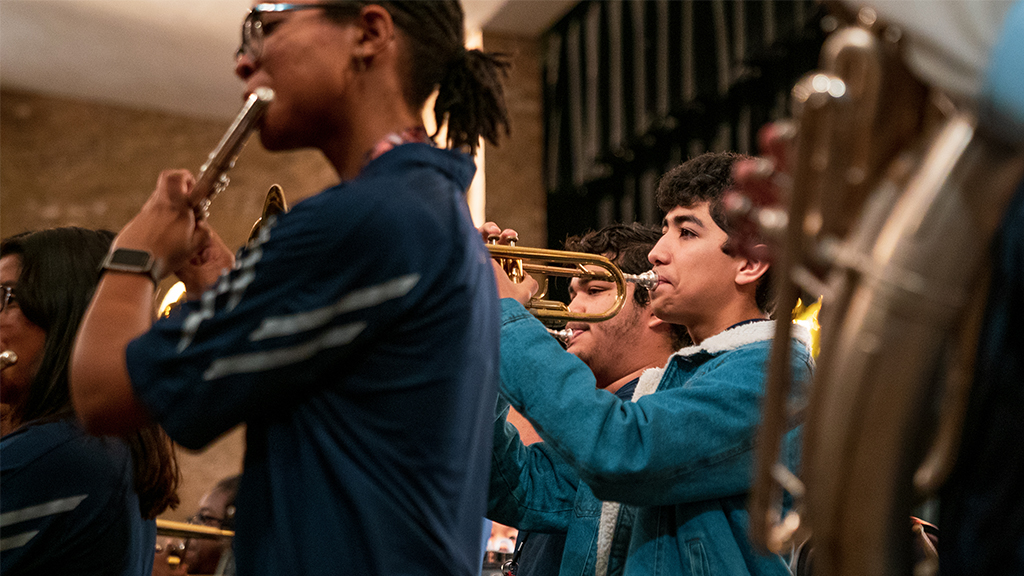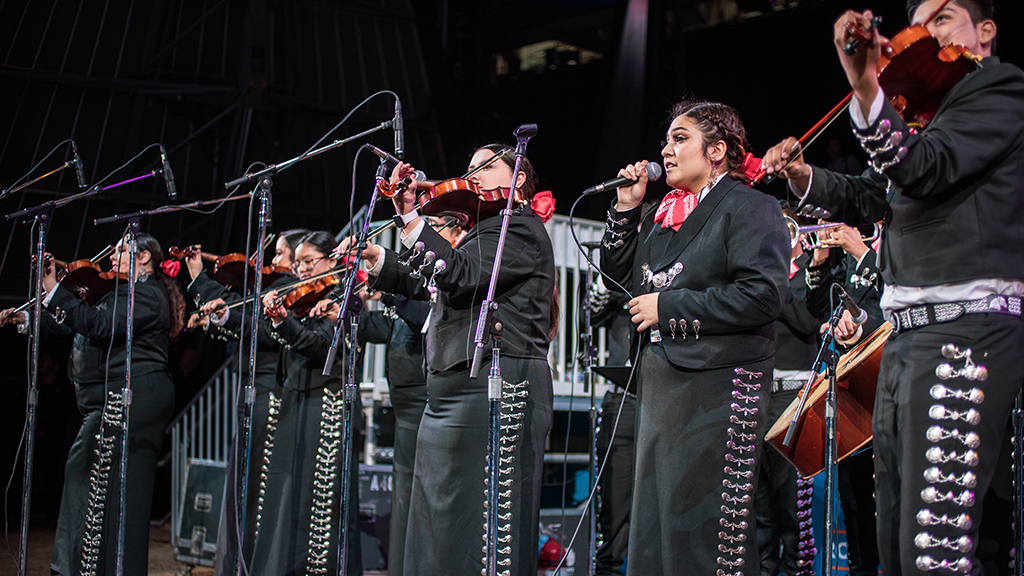‘You can find yourself'
Because they are independent, Texas school districts often cut across municipal and county lines. Aldine, which covers 110 square miles, serves nine communities that are part of the city of Houston and unincorporated Harris County. Some of the communities are urban. Some are rural. Almost all are low income.
According to the most recent statistics available, 72.7 percent of Aldine’s students are Hispanic, 22.7 percent are African American, and 2.4 percent are white. More than a third (34.6 percent) are classified as English Learners.
Acres Homes, which was annexed by Houston in the mid-1960s, once was considered the largest unincorporated African American community in the South. The western part of Acres Homes is in Aldine, one of 20 school districts that serve the fourth largest city in the U.S.
Kaleb Womack, a 2021 Carver graduate who also grew up in Acres Homes, started doing theater as an after-school activity in second grade. At Carver, he performed in five musicals and three University Interscholastic League one-act plays, earning a series of district and regional awards for acting.
“The more I’ve gotten into it, the more I started realizing a lot of school districts don’t have programs like ours,” says Womack, who will major in musical theater at Sam Houston State University this fall. “That’s really, really sad because this is such a safe space for kids like me who need it. It’s been a safe space for me for over 10 years. It’s given me another avenue to let things go that you didn’t know you have bottled up. You can find yourself through the characters you play.”
At the showcase, Williams and Womack performed a scene from “The Diviners,” a play that told the story of a disturbed young man and his friendship with a preacher during the Great Depression. As the two actors ran the scene, Carver High School Theater Director Roshunda Jones watched and then gave additional pointers.
“It doesn’t matter if they never do this show again. They can always learn something new every time they do it,” says Jones, who has been at Carver for 17 years. “I always tell my students, ‘You never stop learning.’”
The care and attention Jones shows her students were evident during and after the showcase. She and her technical director, Jabari Collins, routinely check students’ progress reports and report cards. They do regular “temperature checks” and make sure the students understand “if they’re not being held accountable at home, they’re being held accountable by us.”
“Our students come here from a range of personal experiences. Some come from great loving homes. Some come from places where they need a little more love at school,” Jones says. “We try to create a family environment so that parents know when their children are here, they are safe. They are not getting in trouble.”
Advocate for the arts
Down the hallway from the theater, members of the Carver/Aldine Dance Company were working on a contemporary ballet number. The company, which is open to students in grades K-12, trains throughout the summer months. Doors open at 7:30 a.m., with the formal program running from 9 a.m. to 5 p.m. During the fall and spring, Carver student dancers participate in classes during the school day. Guest teachers work with the students—many of whom come from other schools—from 3 p.m. to 8 p.m.
“We run a school and then we run it like a studio,” company director Sarita Salinas says. “A lot of our kids grow with the program. We’ve had students who have been with us since first grade.”
On this morning, Salinas had the students run through the complex number several times. She circled the mirrored room, which once housed Carver’s entire fine arts department, and talked to individual students about technique. A guest instructor worked separately with another group of students.
Two decades ago, Salinas created the company to provide advanced training to students who were interested in dance but did not necessarily have the financial means to take private classes. Today, Salinas estimates that the Carver dance department works with 120 high school students and up to 40 company members each year. For 10 hours a week of training after school hours, parents never pay more than $150 a month. Costumes for performances are provided by the district.
Students, who audition to be part of the company, now take classes in ballet, modern, contemporary, jazz, hip-hop, tap, aerial silks, and stilt walking. The company has performed at several special events involving Houston Mayor Sylvester Turner, who was raised in the Acres Homes community.
“The most important thing with kids in inner-city schools is giving them the opportunities to perform and providing them with the technique and skills they need, not just to perform but also to be advocates for the arts,” Salinas says. “I want our kids to be able to compete with dance studios and dance companies across the state and city, but I also want them to be prepared to talk to the superintendent or the board about why this is so important in their lives.”
The first time Goffney saw Aldine’s students perform was at a Texas Association of School Boards convention more than a decade ago. She had just become superintendent in Coldspring-Oakhurst CISD, a small district about 55 miles north of Houston, and she was “wowed” by the quality of the performance.
“This was 2008 or 2009,” says Goffney, who later became superintendent in Lufkin ISD before moving to Aldine. “It was just amazing. There were about 10,000 people in attendance, and it was just so great that it stuck in my mind.”
When Goffney arrived in Aldine in the summer of 2018, one of the first places she visited was Carver. “Those students were working all summer,” she says. “Yes, working. I’ve never seen anything quite like it.”

























Share this content